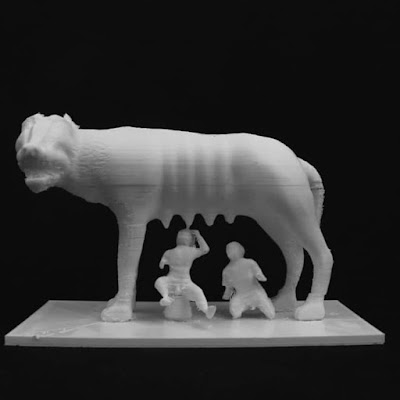Source: Madeleine Muzdakis for My Modern MET
The world's grand museums—such as the Louvre and the Metropolitan Museum of Art—present sculpture to the masses. Ancient marble and modern bronzes are placed in vaulted halls and beautiful gardens so that guests can admire them. The digital developments of the past decade are now bringing the world of famous sculpture to you. If you have access to a 3D printer, you can download and create over 18,000 sculptures and artifacts from around the world thanks to the Scan the World collection on 3D-printing collaborative platform My Mini Factory.
Scan the World is an open-source collection of detailed scans taken of real-life works of art from all across the globe. These scans are downloadable and can be used to 3D-print your own mini masterpieces. An ongoing project by both art lovers and the 3D-printing community, Scan the World has partnered with Google Arts & Culture to acquire scans from museum collections around the world. For some works of art that are publicly displayed or difficult to reach, drones have been used to scan the object.
Included among the thousands of scans are ancient artifacts—such as an Egyptian fish flask, ancient stela with inscriptions, and even the legendary bust of Nefertiti (which can be found at the Neues Museum, Berlin). You will also find works of sculpture stretching from ancient Roman busts to modern abstract creations. Among the famous works you can download and print are Michelangelo's La Pietà, Rodin‘s The Thinker, and The Capitoline Wolf (which shows a young Romulus and Remus, founders of Rome).
The Lewis Chessmen at The National Museum of Scotland. (Photo: Scan the World, CC BY-NC-SA 4.0)
The possibilities are endless while exploring Scan the World. Search by artist, artwork title, or popularity. Scan the World also hosts virtual visits to Paris and Vienna which can satisfy any travel lust. While 3D-printing technology is making huge advancements in the medical fields and offering creative solutions to some of the world's more challenging material science problems, Scan the World proves that the technology can also help bring an interactive art experience to a wide audience.
The Capitoline Wolf at The Musei Capitolini, Rome. (Photo: Scan the World, CC BY-NC-SA 4.0)
The project Scan the World has collaborated with Google Arts & Culture and countless museums to collect over 18,000 scans of artwork, artifacts, and statues from around the world.
 |
| La Pietà by Michelangelo. (Photo: SMK – Statens Museum for Kunst, Public domain) |











No hay comentarios:
Publicar un comentario